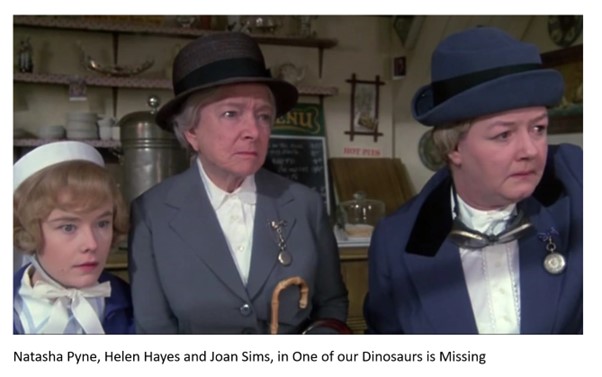Last week, we looked at Christ’s College, Cambridge – originally founded to educate masters to teach older boys. This week we’re going to the other end of childhood.
Let’s start with Friedrich Froebel. An educationalist, Froebel fought against Napoleon whilst serving in the Prussian army and, perhaps more significantly, established the idea of the kindergarten; the notion that very young children could be educated, not just looked after, and that play was a supremely important activity.
Froebel died in 1852, but his ideas lived on. In 1874 the Froebel Society was established in Britain to promote childhood education along Froebel’s lines; Emily Lord, then an infant teacher at the newly-opened Notting Hill High School was in attendance at the first meeting. And clearly the meeting had an effect: in 1876, she founded the Norland Place School, separating the education of the youngest children from the Notting Hill High School. This was also known as Miss Lord’s Kindergarten: Froebel’s ideas in action.
In 1882 Emily – by now married to Walter Ward – ramped things up again, and established the Norland institute. Named for its initial location in London, on Norland Place, the Institute aimed to train young women in childcare and education, elevating the role above that of housemaid.
Judging by the press, it is safe to say that reactions were mixed. Here’s an extract from the “Ladies’ Column”, by “Penelope”, in the Leicester Chronicle of Saturday 16 July 1892, which purred its approval:
A lady who was at the head of one of the best of our kindergarten schools proposes to found an institute for the training of ladies as children’s nurses on Froebelian principles, and she considers that thus a new and congenial occupation will be opened to young women who cannot go through a long course of professional training, even when they are sufficiently endowed intellectually to do so. She suggests that the scheme of training deemed necessary should extend over nine months, and should include three in the institute for the Froebelian training, three months in a children’s hospital, and three months as a probationer in some special institution for making due acquaintance with children and family life. In the institute lessons in needlework and simple dressmaking, cutting out &c would be given, beside practical teaching in simple hygiene and the laws of health – all of which would be invaluable in the daily companion and guardian of one’s children … I think the scheme itself excellent, and I shall be pleased to hear of its success and speedy recognition, both by parents who desire to do the best by their children and by the class of young women who would object to join the ranks of domestic servants, and have neither means nor sufficient education to enter a profession either as certified hospital nurses or thoroughly educated governesses…. The enterprise is known as the Norland Institute …
Compare this with the positively snarky St James’ Gazette of Wednesday 28 September 1892:
A propos of kindergarten work, it will be interesting to watch the experiment being made by Mrs Walter Ward, who has just opened the Norland Institute for the training of kindergarten nurses. The course is to spread over nine months, and the young persons will be given lessons in simple hygiene and useful knowledge (which is somewhat vague), plain cooking, in which the importance of variety in nursery diet will be demonstrated (when one remembers the frequency with which rice-pudding features on nursery table there does seem some room for reform in this direction), and sick nursing. They will also during their residence in the institute receive some instruction in the art of story-telling. Considering the fertility and resource which most domestic servants exhibit in this art when breakages occur or victuals disappear, more especially when there is no household cat, it would almost appear unnecessary to put any further training within their reach; however, this is not the sort of story-telling contemplated by the teachers of the institute, and it will presumably have a “moral significance”. The only point that occurs to one is, Why should these young women be content to remain servants after all this priming; will they not be disposed to enter hospitals or educational establishments or take to literature?
Take to literature! The horror! More seriously, I invite readers to speculate on the gender of the authors of each piece…
Penelope of the Leicester Chronicle was clearly a syndicated column, for she follows up in the Derby Daily Telegraph on 19 December 1892 with a similar laudatory tone, describing a visit to the Norland Institute:
… I was much pleased with the uniform worn by these young women, pretty blue, well-made gowns, with dainty white aprons and caps. Mrs Ward, the originator and manager of this excellent scheme …
Whether one subscribes to the Penelope view or the St James Gazette view, it is clear that class and access to familial resources determined whether a young woman might become a kindergarten nurse or employ the services of such a person. And this becomes more apparent when you consider where else you’ve come across the uniformed kindergarten nurse: this is the ubiquitous British nanny, beloved of 1960’s films (think “One of Our Dinosaurs is Missing”) and Jacob Rees-Mogg. And still in demand today.

The Norland Institute thrived, but it didn’t stay in Kensington. Over the years it has been based in Chislehurst, Kent; and near Hungerford, Berkshire. It still operates today, moving to Bath in 2003. It has come quite a long way from its origins, both literally and figuratively.
Norland College is now an OfS registered provider with taught degree awarding powers since 2019 and a Gold TEF rating. In February 1999 the first male trainee was accepted to the College; and in 2012 the first male undergraduate. The uniform still exists, albeit changed since World War 2, when capes were replaced with coats to cut down on the use of silk, and now with a gender neutral option. A small cohort of students studies for a dual award: a BA Early Childhood Education and Care, and a Norland diploma. The programme includes a lot of practical learning (about a third of the first three years, in eight different settings); and a final year of probationary experience before the Norland diploma is awarded.
You may also have seen Norland on the television: Nanny School followed trainees for a year in 2005-06, although as it was aired on the Discovery Home and Health channel perhaps you missed it.












